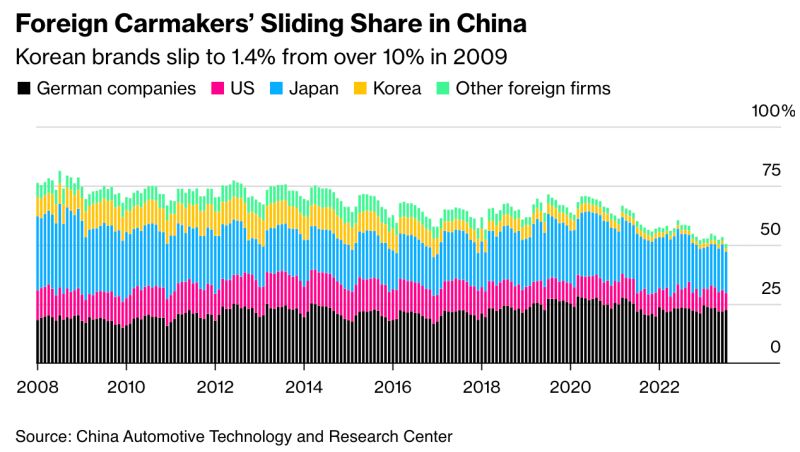Luxury Car Brands Face Headwinds In China: The Case Of BMW And Porsche

Table of Contents
Economic Slowdown and Reduced Consumer Spending
China's economic growth has demonstrably slowed, directly impacting consumer confidence and, consequently, discretionary spending on luxury items like high-end vehicles. This economic slowdown is a major headwind for luxury car brands. Reduced disposable income translates to a decline in demand, forcing brands to re-evaluate their pricing strategies and marketing approaches.
- Reduced Purchasing Power: The decrease in disposable income among Chinese consumers directly impacts their ability to purchase luxury goods, including premium vehicles.
- Lingering Effects of Zero-COVID: The zero-COVID policy and its lingering economic effects continue to dampen consumer sentiment and overall spending. Uncertainty remains a significant factor influencing purchasing decisions.
- Increased Economic Uncertainty: Increased unemployment and a general sense of uncertainty about the future are further contributing to consumers' reluctance to make large, discretionary purchases.
These economic factors are not merely short-term challenges; they represent a fundamental shift in the market requiring long-term strategic adjustments from luxury car brands.
Rise of Domestic Competitors and Electric Vehicle Market
The rise of increasingly sophisticated domestic competitors in the Chinese auto market presents a serious challenge to established luxury brands like BMW and Porsche. Chinese automakers are rapidly improving their technological capabilities and brand image, producing competitive luxury vehicles at potentially lower price points.
- Aggressive Domestic Competition: Chinese automakers are not only competing on price but also on features, technology, and brand appeal, posing a direct threat to foreign players' market share.
- The EV Revolution: The rapid expansion of the electric vehicle (EV) market in China presents both an opportunity and a significant challenge. Established luxury brands must invest heavily in EVs to remain competitive, but profitability in this rapidly evolving sector remains a significant concern.
- Success of Domestic EV Brands: The remarkable success of domestic EV brands like Nio and Xpeng is putting immense pressure on traditional luxury players who need to accelerate their own EV development and deployment.
Shifting Consumer Preferences and Brand Loyalty
The Chinese luxury car market is not static; consumer preferences are evolving rapidly, particularly amongst younger generations. This shift impacts brand loyalty, creating a more dynamic and competitive market.
- Tech-Savvy Consumers: Younger Chinese consumers are prioritizing technologically advanced features, personalized experiences, and connected car technologies. Luxury is increasingly defined by technological sophistication.
- Sustainability Concerns: Growing environmental awareness is influencing purchasing decisions, with increasing demand for electric and hybrid vehicles. Sustainability is becoming a key factor in brand perception and consumer choice.
- Erosion of Brand Loyalty: Brand loyalty is less pronounced among younger Chinese buyers compared to older generations, intensifying competition for market share and requiring brands to constantly innovate and engage with consumers.
- Understanding the Evolving Consumer: Understanding the evolving needs and aspirations of the modern Chinese consumer is paramount for long-term success in this market.
BMW's Response to the Challenges
BMW is actively adapting its strategy to meet the challenges of the Chinese market. This includes significant investments in localizing marketing campaigns, expanding its dealer network, and increasing R&D investment focused on electric vehicles and the development of China-specific models. The focus is on strengthening brand localization and aligning products with evolving consumer preferences.
Porsche's Response to the Challenges
Porsche’s response focuses on leveraging its established brand heritage and exclusivity while strategically investing in high-performance electric vehicles. They are emphasizing brand experience and creating tailored offerings for the Chinese market, while carefully balancing brand exclusivity with market demands.
Conclusion
The Chinese luxury car market presents undeniable challenges for established brands like BMW and Porsche. Economic headwinds, the rapid rise of domestic competitors, and the shift in consumer preferences demand significant strategic adaptation and substantial investment. While both brands are actively implementing strategies to counter these headwinds, their future success hinges on their ability to fully understand and respond to the unique and ever-changing dynamics of the Chinese market.
Call to Action: Stay informed about the evolving landscape of luxury car brands in China and follow our future articles for further analysis of the challenges and opportunities facing BMW, Porsche, and other leading players in this dynamic market. Learn more about the headwinds facing the luxury car industry in China by subscribing to our newsletter.

Featured Posts
-
 Speedway Classic Commissioner Manfreds Insights And Announcements
May 11, 2025
Speedway Classic Commissioner Manfreds Insights And Announcements
May 11, 2025 -
 Henry Golding On Crazy Rich Asians Reunions And The Upcoming Tv Series
May 11, 2025
Henry Golding On Crazy Rich Asians Reunions And The Upcoming Tv Series
May 11, 2025 -
 Hakkaride Duezenlenen Hakim Ve Savcilar Iftar Programi Katilimcilar Ve Etkinlikler
May 11, 2025
Hakkaride Duezenlenen Hakim Ve Savcilar Iftar Programi Katilimcilar Ve Etkinlikler
May 11, 2025 -
 Judges Red Hot Start Highlights Braves Sluggish Offensive Beginning
May 11, 2025
Judges Red Hot Start Highlights Braves Sluggish Offensive Beginning
May 11, 2025 -
 Exclusif Avis D Un Animateur Sur L Arrivee De Hanouna A M6
May 11, 2025
Exclusif Avis D Un Animateur Sur L Arrivee De Hanouna A M6
May 11, 2025
